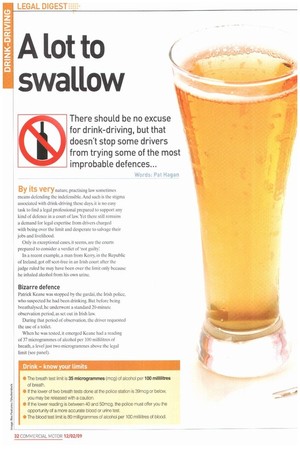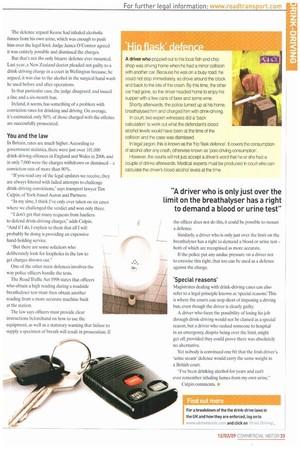A lot to swallow
Page 32

Page 33

If you've noticed an error in this article please click here to report it so we can fix it.
There should be no excuse for drink-driving, but that doesn't stop some drivers from trying some of the most improbable defences...
Words: Pat Hagar
Byits very nature. practising law sometimes means defending the indefensible. And such is the stigma associated with drink-driving these days, it is no easy task to find a legal professional prepared to support any kind of defence in a court of law. Yet there still remains a demand for legal expertise from drivers charged with being over the limit and desperate to salvage their jobs and livelihood.
Only in exceptional cases, it seems, are the courts prepared to consider a verdict of 'not guilty: In a recent example, a man from Kerry, in the Republic of Ireland, got off scot-free in an Irish court after the judge ruled he may have been over the limit only because he inhaled alcohol from his own urine.
Bizarre defence
Patrick Keane was stopped by the gardai, the Irish police, who suspected he had been drinking. But before being breathalysed, he underwent a standard 20-minute observation period, as set out in Irish law.
During that period of observation, the driver requested the use of a toilet.
When he was tested, it emerged Keane had a reading of 37 microgrammes of alcohol per 100 millilitres of breath, a level just two microgrammes above the legal limit (see panel). The defence argued Keane had inhaled alcoholic fumes from his own urine, which was enough to push him over the legal limit. Judge James O'Connor agreed it was entirely possible and dismissed the charges.
But that's not the only bizarre defence ever mounted. Last year, a New Zealand doctor pleaded not guilty to a drink-driving charge in a court in Wellington because, he argued, it was due to the alcohol in the surgical hand wash he used before and after operations.
In that particular case, the judge disagreed, and issued a fine and a six-month ban.
Ireland, it seems, has something of a problem with conviction rates for drinking and driving. On average, it's estimated, only 50% of those charged with the offence are successfully prosecuted.
You and the law
In Britain, rates are much higher. According to government statistics, there were just over 101,000 drink-driving offences in England and Wales in 2006, and in only 7,000 were the charges withdrawn or dismissed — a conviction rate of more than 90%.
"If you read any of the legal updates we receive, they are always littered with failed attempts to challenge drink-driving convictions," says transport lawyer Tim Culpin, of York-based Aaron and Partners.
"In my time, [think I've only ever taken on six cases where we challenged the verdict and won only three.
"I don't get that many requests from hauliers to defend drink-driving charges," adds Culpin. "And if I do, I explain to them that all I will probably he doing is providing an expensive hand-holding service.
"But there are some solicitors who deliberately look for loopholes in the law to get charges thrown out."
One of the other main defences involves the way police officers handle the tests.
The Road Traffic Act 1998 states that officers who obtain a high reading during a roadside breathalyser test must then obtain another reading from a more accurate machine back at the station.
The law says officers must provide clear instructions beforehand on how to use the equipment, as well as a statutory warning that failure to supply a specimen of breath will result in prosecution. If the officer does not do this, it could be possible to mount a defence.
Similarly, a driver who is only just over the limit on the breathalyser has a right to demand a blood or urine test — both of which are recognised as more accurate. If the police put any undue pressure on a driver not to exercise this right, that too can be used as a defence against the charge.
'Special reasons'
Magistrates dealing with drink-driving cases can also refer to a legal principle known as 'special reasons:This is where the courts can stop short of imposing a driving ban, even though the driver is clearly guilty.
A driver who faces the possibility of losing his job through drink-driving would not be classed as a special reason, but a driver who rushed someone to hospital in an emergency, despite being over the limit, might get off, provided they could prove there was absolutely no alternative.
Yet nobody is convinced one hit that the Irish driver's 'urine steam' defence would carry the same weight in a British court.
"I've been drinking alcohol for years and can't ever remember inhaling fumes from my own urine," Culpin comments. M
Find out more
For a breakdown of the the drink-drive laws in the UK and how they are enforced, log on to . and click on
































































































































































